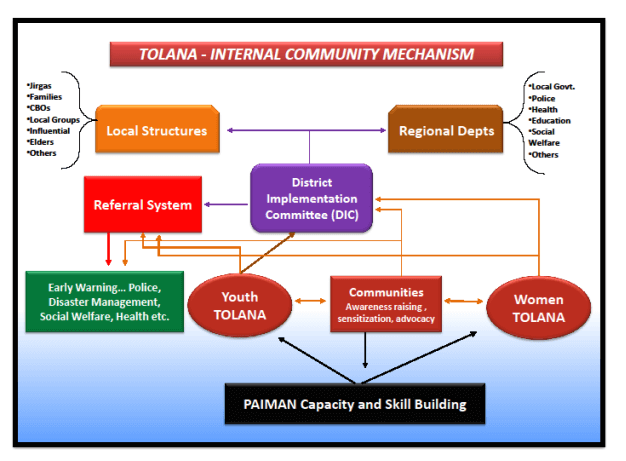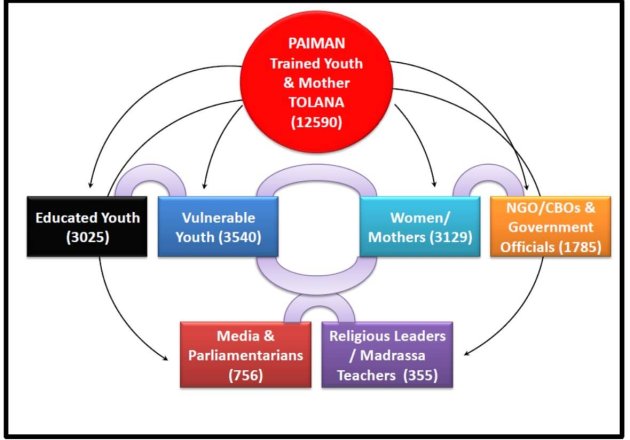Introduction to TOLANA

TOLANA: PAIMAN’s Mothers and Youth Peace Groups |
Whole of Community Approach to Preventing Violent Extremism
It has been PAIMAN’s dream to ensure sustainable peace in those regions of Pakistan which are afflicted by terrorism, violent extremism and unrest. In order to make this dream comes true, it was imperative to come up with a theory of change. PAIMANs theory of change is grounded in its belief that lasting and sustainable peace at grassroots level can only be attained if action is initiated to change the way people view and perceive the world around them. It is important to work on the psyche of people rather than their physical activities for addressing violent extremism. A change in this context can only come about if the psychological aspect of the human communities is catered to in a way that makes them more tolerant and accepting of the others.
PAIMAN embarked upon a program “Lets Live in Peace” in 2008 and started building the capacity of youth, mothers, local male female religious and political leaders, women leaders of all faith and other civil society members in various aspects of community peacebuilding, community dialogue, mediation, networking, preventing violent extremism, advocacy, UNSCR 1325, women role in building social cohesion, peace and Islam etc. Each trainee after completing his/her post training community assignment effectively is then called PAIMAN’s Peace Practitioner (PPP) and becomes member of Youth or Mothers TOLANA as per their gender in their respective areas. TOLANA is a Pashto word means ‘group of people’ or ‘together.’
TOLANA is a local cadre of peace activists who understand the socio-cultural and psychological aspects of their communities and are strategically place to gain the trust of the community when they work with commitment and zeal.
The foundation of the TOLANA stands on four basic pillars which are:
- Leadership – The local youth are mobilized, encouraged and equipped with art of leadership to step forth and strive for attainment of peaceful environment within their communities by applying the skills of community peacebuilding, early warning that they learn during PAIMAN’s trainings.
- Preventing Violent Extremism and Volunteerism – PAIMAN’s training empower members of TOLANA to use alternate narrative to address extremist narrative, to create awareness, to mediate, to identify issues, to serve the community selflessly and passionately—expecting rewards of respect, recognition and peace in their communities
- Civic Engagement –The trainees capacity is built in the concepts of civic education, active citizenry and skills of networking and advocacy to raise voice on issues that affect them, create awareness, advocate for and work collectively for building social cohesion
- Team-building &Networking – The strength of TOLANA lies in its team work-each team members is committed to TOLANA’s vision and mission to work for peaceful communities and because of which they have attained unprecedented success. Their beauty is networking and alliance building vertically and horizontally.
Who is TOLANA’s member |
All the trainees who undergo PAIMAN’s peacebuilding training become members of PAIMAN’s Youth and Mother TOLANA in their respective communities. These includes; educated youth, local women and girls, social and political activist of all faith, female teachers and students of Madaris, members of NGO/CBOs, media, business community, minority groups, transgender and de-radicalized youth.
What is TOLANA’s District Implementation Committee (DIC) |
Mother and Youth TOLANAs are organized in tiers to function more effectively and efficiently.
The first tier of the TOLANA is the District Implementation Committee (DIC). The DIC comprises of the following 3 members:
- Chairperson
- Secretary
- Convener
Elections are held every year for these three positions from among Youth and Women TOLANA members together in their respective district/agency and every member is expected to participate in the voting process.
The second tier of the TOLANA is the youth who are trained by PAIMAN and are working in their respective communities as PAIMAN’s Peace Volunteers.
Working Modality |
- Implementation of Social Action Plans(SAPs): One of the most important components of PAIMAN’s capacity building sessions is the development of (SAPs). As post training assignment, trainees work in groups to carry out community peacebuilding work from TOLANA’s platform under the guidance of the DIC. After the implementation of their (SAPs) the respective TOLANA members present their activity report to PAIMAN’s District Coordinator in the form of success stories/case studies.
- TOLANA’s Activities and Successes
- Sensitization of Communities: Each TOLANA holds community orientation sessions regarding the impact of VE, value of tolerance, peace, mediation and reconciliation.
It has created awareness in 340 educational institutions and Madaris through orientation sessions, theater shows, art and sports for peace, peace poetry and essay competitions etc.
Mothers TOLANA have sensitized and engaged 2900 mothers of vulnerable and extremist youth. TOLANAs have resolved 47 not only decades old community feuds of various natures but current issues as well through community mediation by engaging community women and influential. This collective nature of mediation helps in collective ownership of the issue as well follow-up of the outcome of mediation.
TOLANAs have sensitized 150,000 community members, youth, members of all faith, government officials, representatives of media, CBOs etc in Khyber Pukhtunkhwa erstwhile FATA and more than 21,000 in Karachi regarding causes, impact of VE, interfaith/intra-faith issues and role they can play in addressing it through 14,500 community sessions. TOLANA has played an instrumental role in preventing hundreds of youth form becoming radicalized by sensitizing their families, convincing the radicalized one to join PIMAN’s positive transformation and engagement program.
- TOLANA’s Community Engagement: under the guidance of DICs includes:
- Hold dialogue with parents of militants, ex-militants, sympathizers of militants and vulnerable youth/children to convince them to send their sons/brothers for PAIMAN’s de-radicalization/transformation trainings.
- Regular interaction with district administration and police regarding issues/concerns of community related to violent extremism (VE) and information sharing.
- Interact with local media on regular basis for disseminating information regarding VE, its impact, role of youth and women in addressing it and share best practices for wider circulation.
- Document activities as well as coordinatation.
- Initiate series of dialogues with District Police and community elders to seek help in local level reconciliation as well reintegration of ex-militants, sympathizers of militants in their communities where applicable.
- As the strongest instruments of internal community peace mechanisms provides early warning regarding VE and acts as torch bearer in Community Policing for early response to such incidents in collaboration with police and local influential.
- Obtain, collect and collate useful data of all the actors/stakeholders who can facilitate awareness/advocacy campaigns in particular their families/communities.
- Maintain calendar of activities (local/provincial) organized by other organizations and government in the similar field and explore opportunity for participation.
- Provide support and assist in establishing Referral Mechanism in communities to handle cases of VE as well gender based violence etc in quick response.
Why TOLANAs? |
TOLANA started as a community peace group has evolved into a non-violent movement to address violent extremism, build social cohesion and bring people of different faith, ethnicity, sects and clan together. TOLANA is an alternative mechanism focusing on the resolution of local conflicts through mediation, emphasize reconciliation and community cohesion and play an important role in conflict prevention and early warning systems. TOLANA provides an effective platform for mentoring youth to learn new ways of nonviolent behavior, act as pressure group and advocate for issues affecting the community.
This internal community mechanism for building social cohesion can be adapted by any community anywhere globally.




